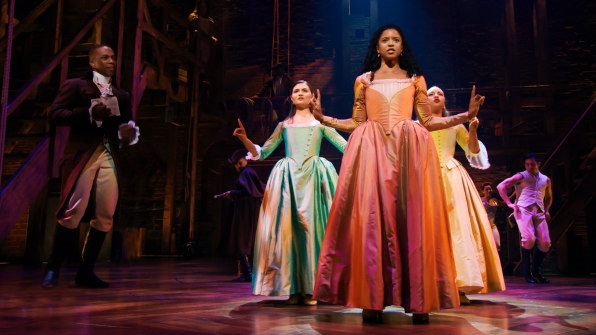In case you haven’t heard, at 3 a.m. on Friday, July 3, a filmed version of the culture-reshaping musical Hamilton is launching on Disney Plus, the streaming service that Disney launched to much ballyhoo last fall in an effort to take on Netflix in the streaming wars.
Until two weeks ago, you could have signed up for a free one-week trial of Disney Plus, watched Hamilton, maybe screened your favorite Marvel movie for the 10th time, and then canceled.
But back on June 19, a French news site, of all places, noticed that Disney had quietly dropped its free-trial offer. So if you want to see Hamilton on Disney Plus, that’ll be $6.99 please.
In any world, getting to see Hamilton from the comfort of your own couch for a mere $7—the cost of a monthly Disney Plus subscription— would be major news.
The move, though, is wrapped up in everything from how the pandemic has upended Disney’s famed business model to Hollywood’s uncertainty about the future of movie theaters to the now raging streaming wars. So if you want to know why you have to pay up to see Hamilton this weekend, the backstage strategic machinations are almost as compelling as the stage play itself.

We all scream for streaming
Disney announced its $75 million purchase of Hamilton in early February, and, at that time, it intended to release the movie in theaters in October 2021.
Disney presents: Hamilton.
With The Original Broadway Cast.
Filmed onstage at The Richard Rodgers Theatre.
In A Theater Near You.
October 15, 2021. #Hamilfilm pic.twitter.com/08YP6CTbF8— Walt Disney Studios (@DisneyStudios) February 3, 2020
As COVID-19 spread and Disney was forced to delay its live-action version of Mulan (originally set for a late March release) and Black Widow (May)—as well as close its theme parks, shutter its cruise business, and cope with the loss of live sports, releasing a hot property direct to its streaming service, which once would have been unthinkable, became more of a possibility.
Disney had apparent success releasing Pixar’s Onward onto Disney Plus much earlier than originally planned, and at the time giving stressed-out families something fresh felt like a gift and rather magnanimous.
But Hamilton is different.
In today’s COVID-19 reality, Lin-Manuel Miranda’s hip-hop retelling of American Revolutionary history is arguably the cultural event of the summer. While there’s been some fun stuff so far, such as Judd Apatow’s The King of Staten Island and Trolls World Tour, both of which decided to go digital-first after theaters closed, there has yet to be any single movie that has united watchers in a virtual water-cooler moment of chatter and excitement. (On the TV front, there have been cultural splashes like Tiger King and The Last Dance.)
Although Disney Plus has amassed 54.5 million subscribers in just over half a year (as of Disney’s last update in May), it is still leagues behind Netflix, which has over 180 million subscribers. Which helps explains Disney’s not-so-subtle decision to end its Disney Plus promotions before Hamilton‘s release.
Indeed, polling suggests that moving up Hamilton and using it to drive awareness and sign-ups of Disney Plus is a bravura move. According to a CivicScience poll, 32% of people who intend to sign up for Disney Plus but haven’t yet say that having Hamilton on the platform makes them more likely to subscribe.
“Normally on the Fourth of July, you can start to look back at the summer—which for movies starts in April—and say, ‘Okay, what are the big movies of the summer? Usually by then there are several films” that stand out as the big hits, says Ben Carlson, SVP and general manager of streaming and platforms at MarketCast. “But this year, there’s only Hamilton. In terms of buzz, this is it. It is the one, big movie.”

Something for everyone
Hamilton—with its built-in audience of fans, many of whom never got to see the staged production, and raging social media buzz, not to mention stellar reviews—is the closest thing to a surefire bet that Disney has on its hands right now.
It also has the added benefit of being as popular with tweens as well as their parents, meaning that Disney will likely not just boost subscriptions to Disney Plus but also capture a wide swath of the population much in the way it did at launch with the Star Wars spin-off series The Mandalorian.
“Hamilton fills a strategic gap that Disney has,” says one industry source. “In a rare lapse, they really don’t have content on Disney Plus that crosses every gender, race, age, and taste. Hamilton solves all that.”
Disney Plus’s content right now is “different remakes and chapters of things that people are familiar with and love, but let’s say it’s a hundred yards wide and an inch deep,” this person adds.
This reasoning explains why Disney is opting to forgo the more lucrative box-office dollars that Hamilton presumably would have brought in had it been released in theaters. “Hamilton probably could have opened to $150 million in theaters,” this person says. “But the future of Disney is Disney Plus. It’s not the theatrical experience. And by the way, they still have Mulan and the next Marvel movie, so they’re not really robbing themselves of an opportunity.”
The streaming-first decision also makes sense given that Hamilton is ultimately not a global brand in the way that Star Wars and Marvel movies are—those films make $150 million in the first few hours of their global releases and ultimately go on to bank not just millions but billions. Given that Disney Plus is still early in its global rollout beyond the United States, Hamilton, whose audience is primarily on this continent, is an ideal fit for the platform.
Is ‘Hamilton’ on Disney Plus good for Hollywood?
But if Hamilton is good for viewers and good for Disney, the ultimate question is, is it good for the industry? Does it mark a turning point in the digital versus theatrical debate that is raging all the more vigorously thanks to the pandemic?
This push-and-pull is playing out across Hollywood with studios like NBCUniversal leaning hard into digital (the studio was behind Trolls World Tour and The King of Staten Island) and Warner Bros. remaining committed to theatrical with films like Christopher Nolan’s Tenet. Disney has seemingly split the difference, delaying its biggest movies but feeding its streaming service with its slightly lesser titles.
In many ways, then, Hamilton provides the ultimate test case for whether a streaming debut can be as momentous and lucrative as a theatrical one—even though it’s a difficult, perhaps impossible, equation to solve given that there’s no numerical figure to demonstrate the value of a long-term Disney Plus subscriber.
Some observers say no way. The economic upside of the box office is simply too great to forgo theatrical releases, particular for expensive blockbusters. “This isn’t a make or break for Disney,” says media analyst Dan Rayburn. “Where does Disney make money from movies? It’s the big stuff. People who say Hamilton is on par with Star Wars—what planet do they live on?
“This is a great way to leverage the streaming platform of Disney Plus to highlight a piece of content that can’t be seen because of the current business environment,” Rayburn adds. “It doesn’t cost Disney any additional money to stick it online. It’s already been produced and helps promote Disney Plus. But Disney is not a nonprofit. There’s a reason that with films like Black Widow and (the next) James Bond, studios said, ‘Let’s wait till the end of the year.’”
Carlson argues that for movies that are “finished and ready to go,” streaming offers studios a valuable distribution option. “As production remains frozen, those movies are increasing in value—both for the studios that own them and for audiences who can’t wait for something huge and new,” he says. “The ability to monetize that value has not traditionally been possible.”
But with proprietary services like Disney Plus and HBO Max (owned by WarnerMedia, the same parent company as Warner Bros.), he thinks studios will start experimenting more with less time between theatrical and digital releases, as well as straight-to-digital releases.
Blair Westlake, former chairman of Universal Television and head of media and entertainment for Microsoft, sees things similarly. “I anticipate fewer films making their way to theaters in the future,” he says. “Studios will be far more select in which films are actually worthy of the marketing expense and all that goes into maximizing the return of multi-hundred-million-dollar films. Particularly Disney, Warner Bros., and NBCUniversal that have SVOD affiliates—Disney Plus, HBO Max, and Peacock—will lead the charge of direct-to-consumer for many titles. They’re starting to embrace through their actions, not just soundbites, that the consumer must come first.”
Fast Company , Read Full Story
(50)